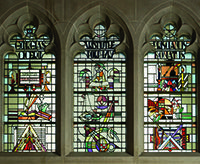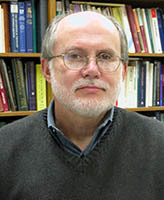
The University of Notre Dame is participating in Humanities Without Walls—a consortium of 15 universities, dedicated to collaborative research, teaching, and the production of scholarship in the humanities.
Funded by a $3 million grant from The Andrew W. Mellon Foundation, the project is led by the Illinois Program for Research in the Humanities ( IPRH ) at the University of Illinois at Urbana-Champaign.
“We are delighted to be a member of this unique consortium, which offers humanities scholars in the University’s College of Arts and Letters an opportunity to conduct research with peers at other research universities in the Midwest,” says Kenneth Garcia, associate director of Notre Dame’s Institute for Scholarship in the Liberal Arts ( ISLA ).
Humanities Without Walls will fund two core initiatives. The first supports the development of summer workshops for graduate students in the humanities who intend to pursue careers outside the academy. The first three-week pre-doctoral workshop will take place in Chicago during the summer of 2015. Cohorts of 30 graduate students will be selected in a spring competition conducted by the humanities centers.
The second initiative will fund cross-institutional teams of faculty and graduate students pursuing research that focuses on The Global Midwest. This program is intended to stimulate research that rethinks and reveals the Midwest as a major force in this century’s global economy and culture for scholars, policy-makers, government officials, social scientists, and an enlightened public. It also seeks to demonstrate how the “applied humanities” can contribute to the work on grand intellectual challenges.
 Ken Garcia
Ken Garcia
“The Global Midwest initiative will encourage scholars to pursue research questions on a global scale across multiple eras and multiple disciplines,” Garcia says. “With the help of the Mellon Foundation funding, we at ISLA are looking forward to offering grants to scholars working in these areas.”
This spring, ISLA will issue a request for proposals to all faculty in the College of Arts and Letters for projects to be carried out during the 2014-15 academic year. The review committee will select a team of senior scholars in the humanities, social sciences, and arts whose projects will strengthen ties with other scholars in the consortium and best fit with the mission of the Global Midwest initiative.
In addition to Notre Dame, the consortium includes the University of Illinois at Chicago, and 13 of the institutions that belong to the Committee on Institutional Cooperation ( CIC )—Indiana University, Michigan State University, Northwestern University, Ohio State University, Penn State University, Purdue University, and the Universities of Chicago, Iowa, Michigan, Minnesota, Nebraska, and Wisconsin-Madison.
“This is an enormously exciting opportunity that will increase the impact and visibility of the humanities and arts at the University of Illinois and throughout the Midwest,” says Dianne Harris, IPRH director and principal investigator. “I have outstanding intellectual partners in this consortium.
“Working together, we developed a set of initiatives that will allow us to experiment at a very large scale, and to stimulate new research practices and the creation of new knowledge across some of the world’s most esteemed research universities. I am very grateful to the Mellon Foundation for making this possible.”
The Humanities Without Walls consortium will be the first of its kind to experiment with cross-institutional collaboration on such a large scale.
Individuals and groups interested in applying for funding for the Global Midwest initiative may visit the Humanities Without Walls wiki for more information. The wiki allows interested parties to informally register their project ideas, find other scholars, and form teams. Registering a project on the wiki is not an official application for funding or a guarantee of funding.